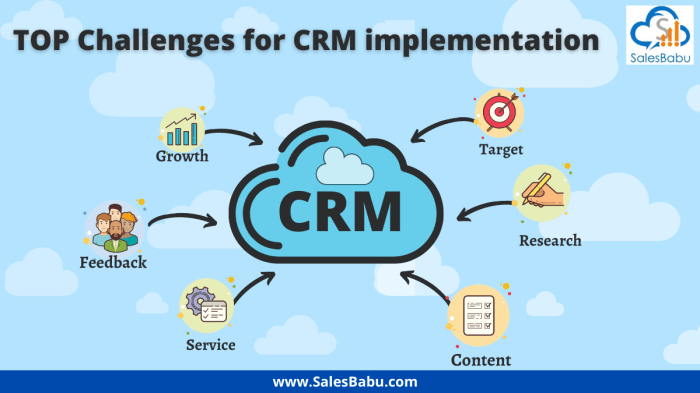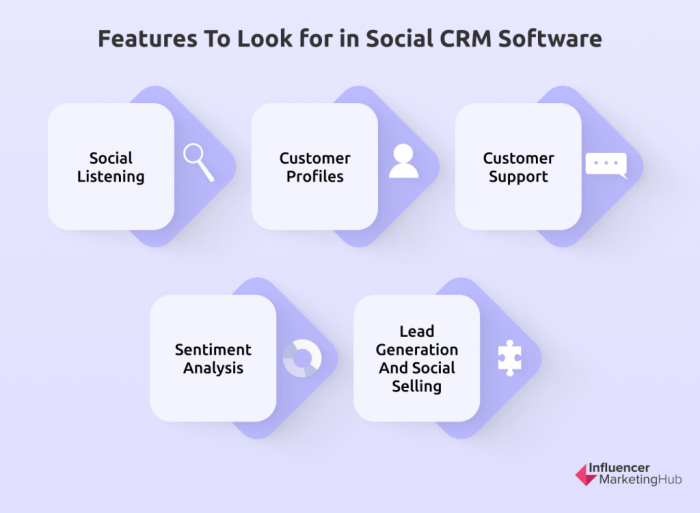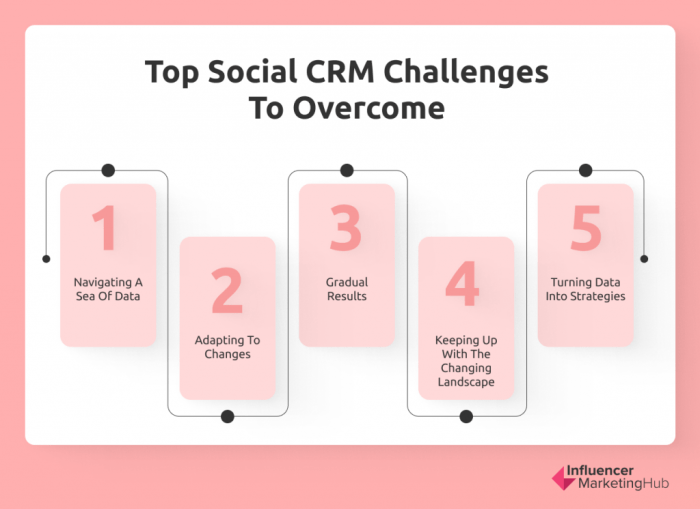Understanding Social CRM
Social CRM: Challenges and Opportunities – Social CRM (SCRM) is a customer relationship management (CRM) approach that leverages social media and other online channels to engage with customers, build relationships, and provide support.
Key components of SCRM include:
- Social media monitoring: Tracking and analyzing social media conversations to identify customer needs and trends.
- Social media engagement: Interacting with customers on social media platforms, responding to inquiries, and providing support.
- Social data integration: Integrating social media data with CRM systems to provide a comprehensive view of customer interactions.
- Social media analytics: Measuring the effectiveness of social CRM efforts and identifying areas for improvement.
Examples of Effective SCRM
Many businesses have successfully implemented SCRM to enhance customer engagement and improve business outcomes. For example:
- Starbucks uses social media to connect with customers, share product updates, and provide customer support.
- Zappos is known for its exceptional customer service on social media, resolving issues quickly and efficiently.
- Dell uses social media to gather customer feedback and identify product improvement opportunities.
Challenges of Social CRM

Implementing Social CRM can be a daunting task for businesses. There are several challenges that need to be addressed to ensure successful implementation and utilization of Social CRM.
Data Management
One of the biggest challenges of Social CRM is managing the vast amount of data that is generated from social media platforms. This data can include customer interactions, feedback, complaints, and more. Businesses need to have a robust data management system in place to collect, store, and analyze this data effectively.
Integration with Existing Systems
Another challenge is integrating Social CRM with existing business systems, such as CRM, ERP, and marketing automation platforms. This integration is necessary to ensure that all customer data is centralized and accessible to all relevant departments within the organization.
Privacy and Security Concerns
Social CRM involves collecting and storing personal data from customers. This raises privacy and security concerns that businesses need to address. They need to ensure that customer data is collected and used in a responsible and ethical manner, in compliance with all applicable laws and regulations.
Resistance to Change
Implementing Social CRM can require significant changes in business processes and workflows. This can lead to resistance from employees who are comfortable with the existing systems and processes. Businesses need to address this resistance by providing proper training and support to employees.
Lack of Skilled Professionals
Social CRM requires a specialized skill set that includes knowledge of social media platforms, data analysis, and customer relationship management. Finding and hiring qualified professionals with this skill set can be a challenge for businesses.
Potential Risks and Limitations
In addition to the challenges mentioned above, there are also potential risks and limitations associated with using Social CRM.
- Negative feedback:Social media platforms can provide a platform for customers to voice their complaints and frustrations. Businesses need to be prepared to handle negative feedback in a professional and timely manner.
- Data overload:The vast amount of data generated from social media can be overwhelming for businesses. They need to have a plan in place to filter and prioritize the data that is most relevant to their business.
- Privacy concerns:Businesses need to be mindful of the privacy concerns associated with collecting and storing customer data. They need to have clear privacy policies in place and ensure that customer data is used in a responsible and ethical manner.
Opportunities of Social CRM
Social CRM presents a wealth of opportunities for businesses seeking to enhance customer relationships and drive growth. By leveraging social media platforms, businesses can gain valuable insights into customer preferences, build stronger connections, and create personalized experiences.
Case Study: Starbucks
Starbucks is a notable example of a company that has successfully implemented Social CRM. Through its “My Starbucks Idea” platform, the coffee giant crowdsources feedback from customers, enabling it to gather insights into product development and service enhancements. This approach has fostered a sense of community and loyalty among Starbucks patrons.
Improved Customer Service
- Social CRM enables businesses to provide real-time customer support through social media channels, resolving issues promptly and efficiently.
- By monitoring social media conversations, businesses can identify customer pain points and address them proactively, improving customer satisfaction.
Enhanced Brand Reputation
- Social CRM allows businesses to build stronger relationships with customers, fostering positive brand perceptions.
- By engaging with customers on social media, businesses can showcase their values, mission, and commitment to customer satisfaction, enhancing their reputation.
Increased Sales and Revenue
- Social CRM provides businesses with opportunities to promote products and services through targeted social media campaigns.
- By building strong relationships with customers, businesses can drive sales and revenue through personalized recommendations and loyalty programs.
Best Practices for Social CRM

To effectively implement and manage Social CRM, it is essential to follow certain best practices. These practices help organizations maximize the benefits of Social CRM and mitigate potential challenges.
Here is a table outlining the different stages of Social CRM implementation and the corresponding best practices:
| Stage | Best Practices |
|---|---|
| Planning |
|
| Implementation |
|
| Monitoring and Measurement |
|
Future of Social CRM: Social CRM: Challenges And Opportunities

The future of Social CRM is bright, with emerging trends and technologies shaping its evolution. Businesses must prepare for this evolving landscape to stay competitive and harness its potential.
One key trend is the integration of artificial intelligence (AI) and machine learning (ML) into Social CRM. AI-powered chatbots and virtual assistants can automate customer interactions, provide personalized experiences, and analyze customer data to identify trends and patterns. ML algorithms can help businesses segment customers, predict their behavior, and tailor marketing campaigns accordingly.
Data Privacy and Security
As Social CRM involves handling vast amounts of customer data, data privacy and security are crucial concerns. Businesses must implement robust data protection measures, comply with relevant regulations, and ensure transparency in data collection and usage. Failure to do so can damage customer trust and reputation.
Social Media Evolution
Social media platforms are constantly evolving, with new features and channels emerging regularly. Businesses must stay abreast of these changes and adapt their Social CRM strategies accordingly. This includes monitoring new platforms, understanding their unique features, and tailoring content and engagement strategies to suit each platform.
Integration with Other Business Systems, Social CRM: Challenges and Opportunities
Social CRM is most effective when integrated with other business systems, such as CRM, marketing automation, and e-commerce platforms. This integration enables seamless data flow, automated workflows, and a comprehensive view of customer interactions across channels.
Employee Advocacy and Engagement
Employees are powerful brand ambassadors and can play a significant role in Social CRM. Businesses should encourage employee advocacy by providing training, resources, and incentives to participate in social media activities. This can extend the reach of Social CRM efforts and enhance brand credibility.
Question & Answer Hub
What is the key benefit of Social CRM?
Social CRM empowers businesses to build stronger customer relationships by leveraging social media platforms to engage with customers, gather insights, and provide personalized experiences.
What are the common challenges of implementing Social CRM?
Businesses may encounter challenges such as data integration, resource allocation, and managing the vast amount of information generated by social media channels.
How can businesses prepare for the future of Social CRM?
Staying informed about emerging technologies, adopting AI-powered tools, and fostering a culture of continuous learning are crucial for businesses to stay competitive in the evolving Social CRM landscape.